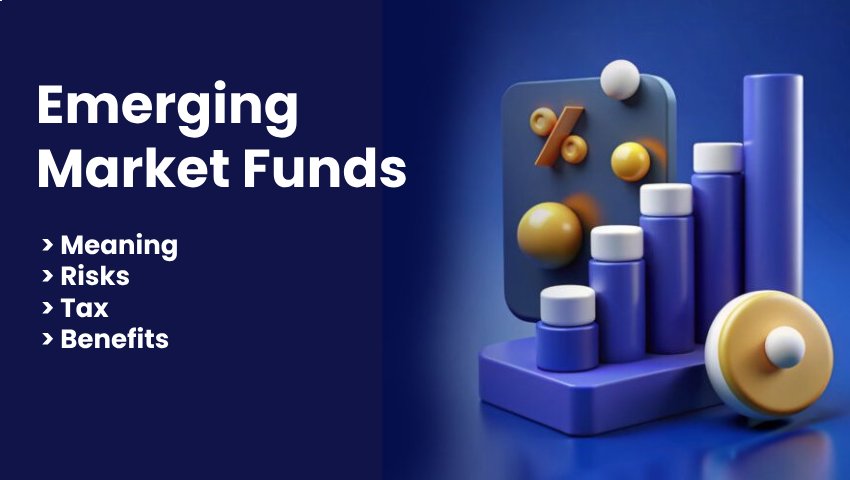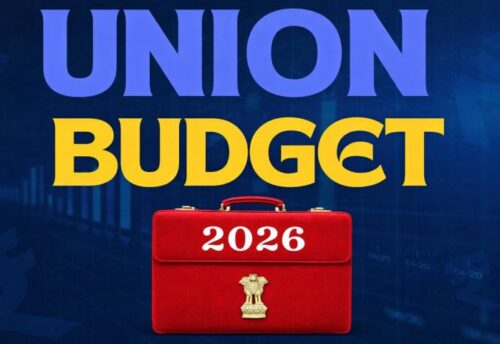
- 14/07/2025
- MyFinanceGyan
- 475 Views
- 2 Likes
- Finance, Investment, Mutual Fund
Emerging Market Funds: Meaning, Risks, Tax & Benefits
One of the best ways to grow your money is to invest in areas that are expected to develop fast. Just like you would buy land or gold expecting the price to go up, you can invest in emerging markets to earn good returns over time. In this blog, we will explain what Emerging Market Funds are, how they work, who should invest in them, and what risks or taxes you should know about.
What Are Emerging Market Funds?
Emerging Market Funds are mutual funds or ETFs (Exchange-Traded Funds) that invest in the stock markets of developing countries, like India, Brazil, Russia, and China. These countries are not fully developed yet, but they are growing quickly. That’s why investing in their markets can give you high returns, but it also comes with higher risks. Instead of directly buying stocks from just one country or company, emerging market funds spread your money across many stocks and countries, reducing your risk.
How Do These Funds Work?
Emerging market mutual funds invest in stocks from multiple countries, sectors, and company sizes (like mid-cap or small-cap).
For example:
- The fund may invest 25% in Chinese companies
- Then split that between sectors like banking, oil, and electricity
- Do the same for other countries
This diversification means your money is not dependent on just one market or sector – making it a safer way to invest in fast-growing economies.
Who Should Invest in Emerging Market Funds?
These funds are high-risk, high-return investments.
- Best for people who can handle market ups and downs
- Suitable for long-term investors (at least 8 years or more)
- Good for those who want to invest globally for future growth
If you’re looking for quick returns, this might not be the right choice. But if you are ready to stay invested for the long run, these funds can be rewarding.
Risks Involved in Emerging Market Funds:
Before investing, you should know the key risks involved:
- Inflation Risk: Fast-growing countries may face high inflation, which can affect profits.
- Currency Risk: The value of the local currency (like Indian Rupee) can change a lot compared to the US Dollar, affecting your investment.
- Liquidity Risk: Shares may not be traded in large volumes, making it difficult to sell quickly.
- Institutional Risk: Rules and systems in developing countries may be weak or unstable.
- Political Risk: Government changes or unstable politics may affect market performance.
While these risks are real, they are also the reason why returns can be high — as you are investing in markets that are still growing.
Expense Ratio:
Every mutual fund charges a small fee called the Expense Ratio. This fee is used to manage the fund.
- It’s shown as a percentage of the total money you have invested.
- A lower expense ratio means more of your money stays invested.
So always compare funds and choose the one with a low expense ratio and a good fund manager.
Match with Your Investment Plan:
As Indians, we already invest in an emerging market — our own country! But many smaller developing countries are also growing fast and can be good options for investment. You can invest a small part of your portfolio in such funds to increase your growth chances. Just like cheering for an underdog, you believe that the country will grow over time. But make sure to research the fund and the fund manager before you invest.
Tax Rules on Emerging Market Funds:
Since these are equity mutual funds, they are taxed like other equity funds based on how long you stay invested:
- Short-Term Capital Gain (STCG)
- If you sell before 1 year
- Tax: 20%
- Long-Term Capital Gain (LTCG)
- If you sell after 1 year
- Gains up to ₹1.25 lakh are tax-free
- Above ₹1.25 lakh, tax is 12.5% (without indexation)
So, staying invested for more than a year is usually better tax-wise.
In Conclusion:
Emerging Market Funds are a smart option for long-term investors who want to benefit from the growth of developing countries. Yes, they come with more risk, but they also offer higher return potential. If you’re okay with market ups and downs, and have the patience to stay invested for many years, these funds can help grow your wealth.
Note: This blog is for educational purposes only. It is not investment advice or a product recommendation. Always do your own research or consult a financial advisor before investing.



